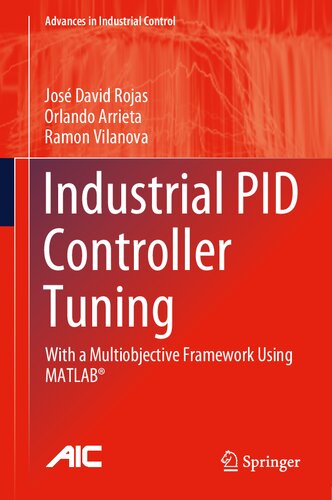

Most ebook files are in PDF format, so you can easily read them using various software such as Foxit Reader or directly on the Google Chrome browser.
Some ebook files are released by publishers in other formats such as .awz, .mobi, .epub, .fb2, etc. You may need to install specific software to read these formats on mobile/PC, such as Calibre.
Please read the tutorial at this link. https://ebooknice.com/page/post?id=faq
We offer FREE conversion to the popular formats you request; however, this may take some time. Therefore, right after payment, please email us, and we will try to provide the service as quickly as possible.
For some exceptional file formats or broken links (if any), please refrain from opening any disputes. Instead, email us first, and we will try to assist within a maximum of 6 hours.
EbookNice Team

Status:
Available4.4
27 reviewsIndustrial PID Controller Tuning presents a different view of the servo/regulator compromise that has been studied for a long time in industrial control research. Optimal tuning generally involves comparison of cost functions (e.g., a quadratic function of the error or a time-weighted absolute value of the error) but without taking advantage of available multi-objective optimization methods. The bookdoes make use of multi-objective optimization to account for several sources of disturbance, applying them to a more realistic problem: how to select the tuning of a controller when both servo and regulator responses are important.
The authors review the different deterministic multi-objective optimization methods. In order to ameliorate the consequences of the computational expense typically involved in their use―specifically the generation of multiple solutions among which the control engineer still has to choose―algorithms for two-degree-of-freedom PID control are implemented in MATLAB®. MATLAB code and a MATLAB-compatible program are provided for download and will help readers to adapt the ideas presented in the text for use in their own systems. Further practical guidance is offered by the inclusion of several examples of common industrial processes amenable to the use of the authors’ methods.
Researchers interested in non-heuristic approaches to controller tuning or in decision-making after a Pareto set has been established and graduate students interested in beginning a career working with PID control and/or industrial controller tuning will find this book a valuable reference and source of ideas.Advances in Industrial Control reports and encourages the transfer of technology in control engineering. The rapid development of control technology has an impact on all areas of the control discipline. The series offers an opportunity for researchers to present an extended exposition of new work in all aspects of industrial control.